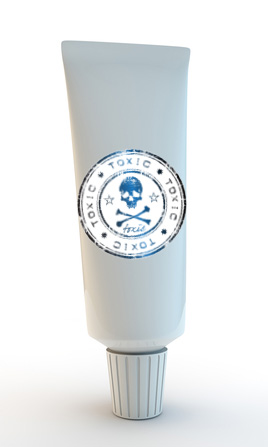Your Non-Toxic Toothpaste Shouldn’t Contain SLS

What one person or company considers a non-toxic toothpaste doesn’t necessarily meet everyone else’s criteria. Some people have used and recommended Tom’s of Maine non-toxic toothpaste for years, but when last we checked, it didn’t meet our definition of non-toxic. That’s because it contains sodium lauryl sulfate or SLS. (The company, owned by Colgate, does make SLS-free alternatives now but still uses SLS in many of its products.)
SLS can cause irritation and other problems including dry mouth. While some research about its other health concerns isn’t conclusive, there’s no reason it needs to be in your toothpaste.
But how can you protect your teeth from cavities while avoiding proven toxins and other substances that simply haven’t been studied enough to know if they’re harmful. Maybe you need to make your own toothpaste or choose your brand more carefully.
The Earliest Known Toothpastes
The toothpastes used by ancient Egyptians were non-toxic toothpastes. Papyrus manuscripts dating back to the 4th century show a simple recipe of mint leaves, salt, pepper and orris. Orris, as you may know, is simply the room of a certain kind of iris. Used these days in talcs, perfumes and even some spice mixtures, it gave this ancient toothpaste its flavor.
Today, some natural, non-toxic toothpaste makers are turning to orris once again.
Bicarbonate of soda — called simply baking soda by many people — will make bread rise, but it also has a long history of use for cleaning teeth. In fact, some of the first tooth powders — predecessors to toothpastes — relied heavily on baking soda.
And that makes sense. Bicarb, as some others call it, can help regulate pH and is a cleaner, deodorizer and proven tooth whitener. So why not choose non-toxic toothpaste choices based on baking soda?
The Bottom Line On Non-Toxic Toothpaste
Choosing the best non-toxic toothpaste for your family comes down to choosing something that you and your family like and will use twice a day that clearly does not contain anything harmful. The best non-toxic toothpastes are:
- fluoride-free. Fluoride is perhaps the most toxic substance in big-name toothpastes, and you can get better, safer results from toothpastes that rely on Xylitol, a natural sweetener that kills bacteria.
- fresh tasting. You won’t use it if it tastes bad, and there’s no reason to settle for a non-toxic toothpaste that tastes bad when other alternatives are available.
- great feeling. Although it serves no medical purpose, you want your mouth to feel fresh and clean, so you want a non-toxic toothpaste that provides that for you.
- reasonably priced. There’s no reason to pay more than perhaps $7 a tube for a good toothpaste. If you’re paying more, you’re paying too much.
Although the best toothpaste can really only be homemade, brands like Weleda and Tea Tree deserve your consideration, but don’t take our word for it. It’s essential that you read labels and know what you’re putting in your mouth every day. Using name-brand traditional toothpastes loaded with toxic and potentially toxic ingredients isn’t smart if your goal is to maintain good oral health and good overall health.
There’s no reason to sabotage your health with bad toothpaste when non-toxic toothpaste is available if you look around a bit.
For a Free homemade, non toxic, toothpaste recipe: http://homemadetoothpaste.net